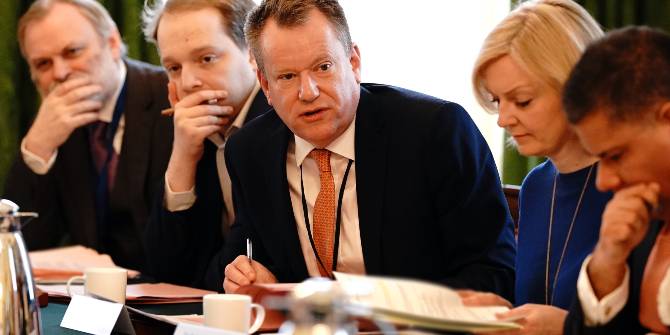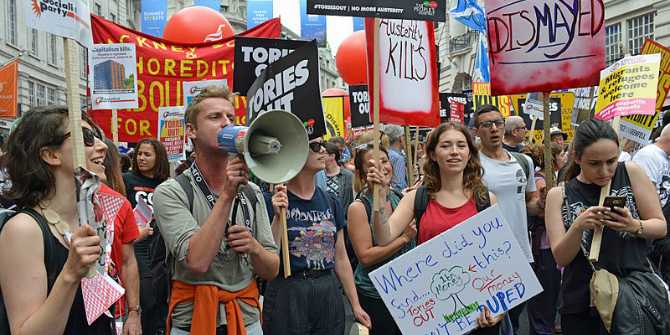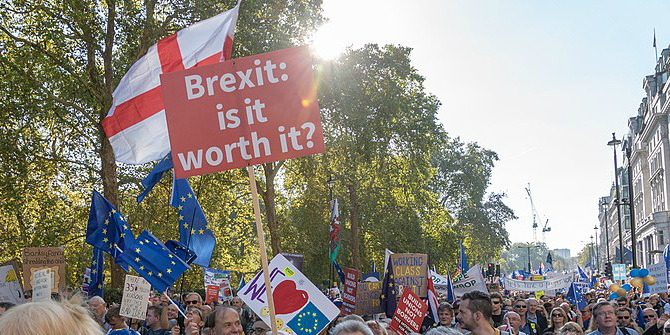The deadline to extend the transition period has lapsed and talks broke up early this week with very little progress made – while the UK government ran into trouble over satellites and Northern Ireland. Ros Taylor and Roch Dunin-Wąsowicz (LSE) round up the week’s Brexit news.
The talks
“It is understood very little progress was made this week,” reported the BBC as EU-UK talks broke up on 2 July, a day early. They will resume in London next week. “EU officials told the BBC that ‘one positive is that the UK now appears to understand our position more clearly on the areas of disagreement’.”
But chief negotiator Michel Barnier said the EU’s positions needed to be “better understood and respected” by the UK:
The EU engaged constructively in this week’s restricted round of 🇪🇺🇬🇧 negotiations, in line with our mandate. We now need equivalent engagement from the UK.
Read my statement following this week’s talks👇🏻https://t.co/Hu2agmgs6N
— Michel Barnier (@MichelBarnier) July 2, 2020
His counterpart David Frost agreed there were ‘significant differences‘. Frost took on another job this week – that of national security adviser, replacing part of Sir Mark Sedwill’s role. Some criticised the appointment, pointing to his lack of experience in the field.

“Giving the post to someone who is leading arguably the most important international talks since the Iraq war in 2003 sends a strong message to Brussels that the UK is prepared to walk away if a deal cannot be struck in summer talks,” says the Guardian’s Lisa O’Carroll. However, now face-to-face talks have resumed there is hope of informal side discussions yielding some progress.
One of the sticking-points is the jurisdiction of the European Court of Human Rights. Lucy Moxham and Oliver Garner consider whether the UK will uphold its commitment to human rights, given that Michael Gove spoke of ‘enhancing’ the Human Rights Act ‘in all sorts of ways’.
Wake me up in September/October. https://t.co/tAM8NEqWjD
— Sam Lowe (@SamuelMarcLowe) July 2, 2020
Businesses should prepare for disruption in 2021 – lots of disruption. Anna Jerzewska warns that government’s “current messaging – vague, contradictory and full of empty promises – may end up giving businesses a false sense of security when they only have a couple of months left to prepare for what’s going to be a systemic shock.”
As of 1 Jan 2021, you will bear the full responsibility for your goods moving across the new border the UK erected with its main trading partner.
You will also be required to deal with the new barriers to trade with 3rd countries that result from us leaving the EU.
/2
— Dr Anna Jerzewska (@AnnaJerzewska) July 1, 2020
The rest
Satellites
The UK has lost out in the Copernicus Earth satellite programme, failing to win any of the main contracts and only two-thirds of the sub-contracting it was hoping for. This was because of the continuing uncertainty over whether Britain will take part in Copernicus: “The belief is continental consortia shied away from including too much UK participation in their Sentinel bids for fear they might have to drop British partners at a later date in what would be disruptive reorganisations.”
Meanwhile, efforts to compensate for the loss of access to the EU’s Galileo satellite navigation system led to a planned investment in OneWeb – but it emerged that the company makes the wrong kind of satellites. Byline Times has further details.
Northern Ireland
The second-largest port in Northern Ireland, Warrenpoint Harbour, needs a massive new facility to handle checks from January, says a local MP. But the harbour’s chief executive is waiting on guidance from the government.
The Guardian has obtained some details of the custom checks that will be required, regardless of whether a deal is done. “Business leaders in Northern Ireland have been pleading with the government for this detail since last October, when the special arrangements for Northern Ireland were agreed between the UK and the EU. But because the prime minister subsequently insisted there would be no checks it became politically challenging to detail the new procedures until last month, when Michael Gove confirmed there would be checks after all.”
“We will have chaos on day one and for many days afterwards,” a source told Business Insider.
On LSE Brexit, Etain Tannam is optimistic about the ‘Shared Island’ document that Ireland’s new coalition government has produced:
Shared Island? There’s hope for British-Irish intergovernmental relations
‘Office for Talent’
Scientists who want to work in the UK will be walked through the immigration requirements by a new ‘office for talent’, which will sit in No 10, reports the Guardian.
Curb your expectations
The German presidency of the EU Council will not be as transformative as many hope, says Matt Bevington – including those hoping for a Brexit breakthrough.
The ‘right’ kind of ties
The things that really bind EU citizens to the UK may not be the same ones that other people, particularly the authorities, perceive as important, write Anna Gawlewicz and Tiina Sotkasiira.
‘Good Bye sagen und dann jahrelang nicht gehen’
Finally, readers who understand German may or may not enjoy this sketch featuring a divorcing couple. The husband (Gross-Britannien) is anxious to continue enjoying all the privileges he previously enjoyed.
Herzlichen Glückwunsch: Das #Brexit-Scheidungsdrama läuft heute schon seit vier Jahren. Ein klassischer britischer Abgang eben: Good Bye sagen und dann jahrelang nicht gehen. pic.twitter.com/7IZluF6Qm0
— extra3 (@extra3) June 23, 2020






